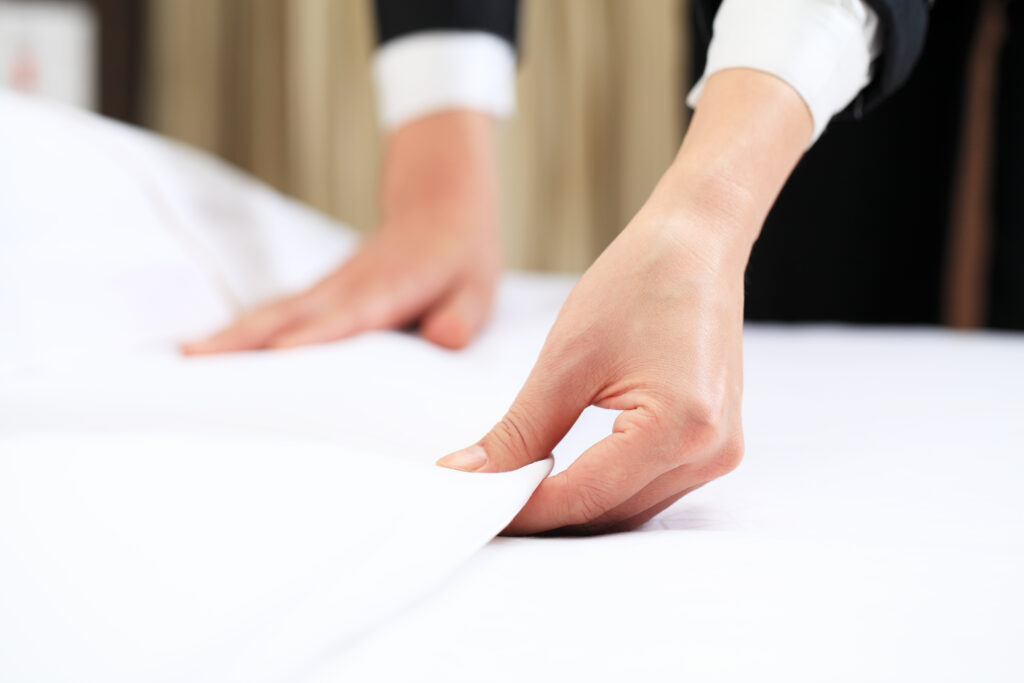Employing Staff
During A
Pandemic Environment
Private Household Staff

Since the start of the global pandemic, all employers have had to navigate a constantly changing landscape when it comes to hiring staff. There is a lot more to think about in the interview and hiring process now, and a need to keep up with ever changing legislation and guidelines. Without an HR team or legal advisor on hand, it is difficult to know what you now can and cannot ask or do.
To help inform you of the current issues with hiring, we have set our responses below to the queries we most commonly are asked.
Can employers require staff to be vaccinated?
There is no specific legislation allowing employers in general to require its employees to undergo medical treatment of any kind, including vaccination. Such a request to have the vaccine could be regarded as a ‘reasonable instruction’ on the part of the employer but this will depend on the circumstances and the job involved. For example, employers in the social care sector may be able to issue a reasonable instruction to employees to take the vaccine because a refusal could put vulnerable people at risk. (In fact, now employees in the home care sector are not able to work unless they have had the vaccine for exactly that reason.) Employers in other sectors arguably do not have the same strong rationale for instructing staff to take the vaccine – for example, professional services, where it has been shown that work can be done effectively from home.
So, unless a family member is medically vulnerable, making a vaccine mandatory for household staff is not legal. Employers who are considering mandating vaccines should also consider whether other, less invasive means of protecting their family may be sufficient as an alternative, such as requiring frequent COVID-19 tests, or ensuring comprehensive use of PPE and other workplace social distancing measures.
When interviewing staff, can clients ask to see their proof of vaccinations from candidates?
Employees cannot be required to show proof of vaccination either at the interview stage or when they start a job. The rationale being that, if there is no law to force employees to be vaccinated, requesting proof of vaccination would influence the decision to employ and therefore could potentially discriminate the employer against the candidate or employee.
If staff are ill because of COVID, who must pay their sick pay?
If an employee is ill, then the employer must pay. Employees will be entitled to the employer’s usual sick leave and pay provisions, including Statutory Sick Pay (SSP). Even if the employee only has mild symptoms, under government guidance they should self-isolate and arrange to have a PCR test. Anyone who has been notified of a positive test result is legally required to self-isolate for ten days at home and is entitled to receive SSP.
Employees or workers are not entitled to SSP if they’re in self-isolation or quarantine after travel abroad and they cannot work from home. But an employer can choose to pay them sick pay – at the same rate as SSP or a higher rate – if they want to.
Some employers can claim back up to 2 weeks’ SSP they’ve paid to anyone because of COVID-19. This only applies to employees who were off work on or before 30 September 2021. For more information, please read here. And the details of the Coronavirus Statutory Sick Pay Rebate Scheme can be found here.
The employer must have an active PAYE scheme in place from 28th February 2020 (and they can only claim for the total number of employees on the scheme at that time).
A total of 2 weeks/14 days SSP can be claimed for each employee:
- £95.85 per week (2020/21)
- £96.35 per week (2021/22)
No SSP claims can be made after 30 September 2021.
If the Government introduces new restrictions in the winter and our staff can’t work within homes, what is the process for pay?
Should this be the case, the Government will need to reopen the Job Retention Scheme (which is very doubtful). The current guidance stipulates that all double-jabbed employees can continue to work unless they test positive for COVID.
If the Government does reintroduce restrictions, then they will have to also review all previous schemes that they had in place. It is very unlikely that they will open the furlough scheme again. They will wish to keep people in work for as long as possible. If staff have to self-isolate at home, then employers will have to continue paying them as set out above.
For your information, the following categories of people are currently entitled to SSP under the amended SSP Regulations:
- Anyone self-isolating for the mandatory ten-day period with Covid-19 symptoms.
- Anyone self-isolating for the mandatory ten-day period due to living with or being in a linked or extended household (a “support bubble”) with someone who has symptoms or tested positive for Covid-19. The definition of a linked or extended household varies between England and the devolved nations. A linked household in England (or an extended household in Scotland) is where a single adult or a single parent with children under the age of 18 have chosen to be linked together with another household. In Wales, an extended household means two households that have agreed to be treated as a single household.
- Anyone who has been officially notified that they should self-isolate under the NHS Test and Trace service (because they tested positive or have been identified as a close contact of someone who tested positive) and is not able to work remotely.
- Anyone (unable to work from home) who has received written notification that they will be undergoing a medical procedure in hospital and have been advised to self-isolate for a period of up to 14 days before their admission.
On 16th August in England, it was stated that individuals who have had close contact with someone who has tested positive will not be legally required to self-isolate if any of the following apply:
- They are fully vaccinated.
- They are below the age of 18.
- They are part of an approved COVID-19 vaccine trial; or they are not able to get vaccinated for medical reasons.
- They will be advised to take a PCR test as soon as possible instead.
It is now an offence for an employer to knowingly allow staff (including agency workers) to come to work if they have been required to self-isolate because they have tested positive for Covid-19 or have been officially notified by NHS Test and Trace that they have been in contact with someone who has.
There is also a legal requirement for both employees and agency workers to notify their employer that they are required to self-isolate and to let them know how long for.
So, what next?
As we head into the winter, there could be more guidelines and rules imposed, but for now the most important thing you can do in the interview and hiring process is explain why you are asking questions about COVID-19 and explain the current process for sick pay and isolation so both parties are well informed.
This article has been written by our partners, PCPayroll & Legal.
Their expert legal and payroll team has been working with employers and their household staff since 2011. They provide expert household employee payroll and legal contract services, complemented by excellent customer service. To find out more about the services that they offer, please contact info@pcpayroll.co.uk. Alternatively, if you would like to speak to a member of the team at SILKS, please contact us here.

